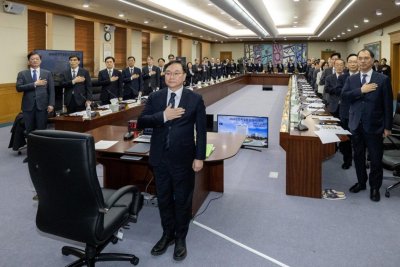Court chiefs voice regret over judicial reform bills

Park Young-jae (C), head of the National Court Administration, and justices salute the national flag during a meeting with chiefs of district and appellate courts nationwide at the top court in Seoul, South Korea, 25 February 2026. Park said that the opinions of the judiciary should be reflected in deliberations for controversial judicial reform bills pushed by the ruling Democratic Party (DP), after three DP-led bills were met by strong opposition from the judiciary. Photo by YONHAP / EPA
Feb. 25 (Asia Today) — Senior judges from courts across South Korea expressed “serious regret” Tuesday over a package of judicial reform bills advanced by the ruling party, warning of potential side effects and calling for broader consultation.
At an extraordinary meeting held at the Supreme Court in Seoul, court presidents reviewed the so-called three judicial reform bills – which include creating a new offense of “distortion of law,” introducing a constitutional complaint system against court rulings and expanding the number of Supreme Court justices.
The meeting was led by Court Administration Chief Park Young-jae and attended by chief judges from courts nationwide.
In a joint statement, the judges said fundamental changes to the judicial system could produce irreversible and significant consequences and should be subject to in-depth discussion through a consultative body that includes multiple institutions and experts.
Regarding the proposed “distortion of law” offense, the judges said the elements of the crime remain abstract even under a revised draft and warned that the scope of punishment could be overly broad. They cautioned that the measure could lead to a surge in complaints and accusations against judges, potentially undermining the swift administration of justice and the protection of citizens’ fundamental rights.
On the proposed constitutional complaint system against court rulings, the court presidents said it could delay the finality of judgments and subject litigants to repeated proceedings.
While acknowledging the need to increase the number of justices at the Supreme Court of Korea, the judges said adding a large number in a short period could weaken trial quality. They suggested first expanding the bench by four justices and reviewing the impact before considering further increases.
In opening remarks, Park said the bills would significantly affect the judiciary’s core role in safeguarding constitutional order and citizens’ rights and stressed that the courts’ views should be reflected in the legislative process.
— Reported by Asia Today; translated by UPI
© Asia Today. Unauthorized reproduction or redistribution prohibited.
Original Korean report: https://www.asiatoday.co.kr/kn/view.php?key=20260225010007747
